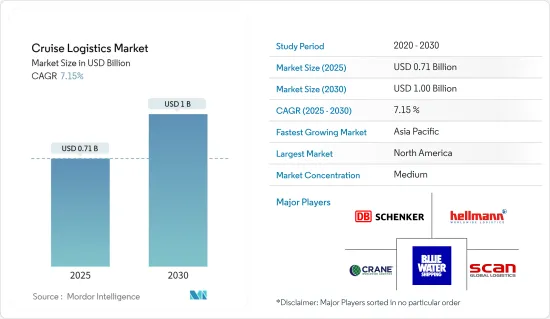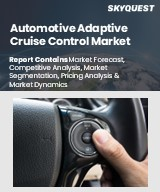
|
시장보고서
상품코드
1636199
크루즈 물류 시장 전망 : 시장 점유율 분석, 산업 동향 및 통계, 성장 예측(2025-2030년)Cruise Logistics - Market Share Analysis, Industry Trends & Statistics, Growth Forecasts (2025 - 2030) |
||||||
크루즈 물류 시장 규모는 2025년에 7억 1,000만 달러로 추정되며, 예측 기간(2025-2030년)의 연평균 성장율(CAGR)은 7.15%로, 2030년에는 10억 달러에 달할 것으로 예측됩니다.

친환경 용품과 지속 가능한 연료 옵션을 갖춘 친환경 크루즈 운영으로의 전환은 물류 제공업체에게 새로운 환경 규제 및 표준에 적응할 것을 요구합니다. 스웨덴의 크루즈 시장은 친환경적인 선택을 우선시하고 책임감 있는 관광을 장려하는 등 지속 가능성을 점점 더 강조하고 있습니다.
스톡홀름항은 2023년 초부터 업무용 차량을 Mk1 디젤 대신 바이오디젤(HVO100)로 전환하여 연간 약 200톤의 화석 이산화탄소 배출량을 감축하고 있습니다. 목표는 2030년까지 스톡홀름항에서 화석연료를 사용하지 않는 운영을 실현하는 것입니다. 또한 2024년 7월부터 크루즈 선사들은 플라스틱, 종이, 금속 등 최소 세 가지 종류의 폐기물을 분리하여 관리하도록 권장하고 있습니다.
크루즈선에서는 폐기물 발생을 최소화하기 위한 다양한 노력이 시행되고 있습니다. 예를 들어, 코스타 크로시에르의 4GOODFOOD 프로그램은 2030년까지 음식물 쓰레기를 50% 줄이겠다는 유엔의 지속 가능한 개발 의제 목표에 따라 선박 내 음식물 쓰레기를 절반으로 줄이는 것을 목표로 하며, 현재 8개 유럽 기항지에서 시행되고 있습니다.
크루즈선에서 음식물 쓰레기를 효과적으로 줄이려면 정밀한 물류 관리, 첨단 콜드 체인 물류, 더 나은 포장 솔루션, 최적화된 배송 일정을 통해 식품 품질을 보장하고 운송 및 보관 중 변질을 최소화할 수 있어야 합니다. 지속 가능성을 향한 이러한 변화는 환경 문제를 해결하고 크루즈 물류 산업 내에서 보다 탄력적이고 미래 지향적인 접근 방식을 촉진합니다.
크루즈 물류 시장 동향
크루즈 물류의 통합 및 향상을 위한 동향
크루즈 승객 시장은 2023년에 55%의 괄목할 만한 성장을 보일 것으로 예상되며, 이에 따라 주요 물류 기업들이 서비스를 강화하고 있습니다. 그중 한 업체인 기술 중심의 글로벌 운영으로 유명한 Radiant Logistics는 2024년 2월에 전략적인 움직임을 보였습니다. 이 회사는 플로리다주 도랄에 위치한 두 개의 비상장 회사인 셀렉트 로지스틱스와 셀렉트 카티지(Select Cartage Inc.)를 인수했습니다. 이 회사들은 2007년 인수 당시부터 Radiant의 애드컴 월드와이드 브랜드에 속해 있었으며, Radiant의 확장 중인 크루즈 물류 포트폴리오에 통합되었습니다. 업계 표준에 따라 Radiant의 거래 구조는 인수 대금의 일부를 인수한 회사의 향후 실적과 연계했습니다.
Radiant의 인수 전략은 성장을 도모하고 크루즈 물류 분야에서 입지를 공고히 하고 강화하는 것입니다. Radiant는 이들 기업을 Adcom Worldwide 브랜드에 통합함으로써 크루즈 운영에 필수적인 운송, 창고 및 기타 핵심 물류 기능을 비롯한 서비스 제품군을 강화하는 것을 목표로 하고 있습니다.
이러한 업계 전반의 추세는 크루즈 부문을 위한 맞춤형 엔드투엔드 물류 솔루션으로의 전환을 강조합니다. Radiant 로지스틱스와 같은 기업은 인수를 통해 프로비저닝, 창고 보관, 세관 중개, 항만 운영 등 종합적인 물류 지원을 제공할 준비가 되어 있습니다. 인수 비용을 미래 성과와 연계하는 데 중점을 두는 것은 점점 더 복잡해지는 크루즈 물류의 수요에 맞춰 성장과 운영 우수성에 대한 업계의 노력을 강조하는 것입니다.
환경 친화적인 노력이 유럽의 크루즈 물류를 변화
2023년 6월, 세계 최초의 친환경 크루즈 선박이 벨기에 앤트워프 항구에서 10일간의 북해 투어를 위해 처녀 항해를 시작했습니다. 300m 길이의 이 선박은 환경에 미치는 영향을 최소화하면서 럭셔리한 경험을 제공하는 최초의 선박으로, 환경을 생각하는 여행객을 대상으로 합니다.
유럽 교통 및 환경 연맹은 친환경 크루즈 체험의 증가 추세를 강조하기 위해 '지속 불가능한 것을 지속하다'라는 슬로건으로 '100% 친환경 크루즈'를 홍보하는 모의 캠페인을 시작했습니다. 스위스에 본사를 둔 MSC 크루즈와 같은 회사는 석유를 대체할 친환경 연료로 액화천연가스(LNG)를 옹호하지만, LNG에는 환경적인 단점이 있습니다. 연소 시 CO2를 배출하고 지구 온난화 잠재력 측면에서 CO2보다 훨씬 더 강력한 오염 물질인 메탄을 누출합니다.
그린 크루즈를 향한 이러한 노력은 친환경 물류 솔루션에 대한 수요를 창출하고 있습니다. 여기에는 유기농 식품 및 친환경 제품과 같은 지속 가능한 공급품을 소싱 및 운송하고 연료 관리 및 폐기물 처리에서 친환경 관행을 채택하는 것이 포함됩니다. 지속 가능성을 우선시하는 여행객이 늘어나고 규제가 엄격해짐에 따라 물류 기업은 친환경 물류 인증 및 정기적인 환경 영향 감사를 통해 이러한 새로운 표준을 준수해야 합니다.
크루즈 물류 산업 개요
크루즈 물류 시장의 경쟁 환경은 기술 발전, 규제 장애물, 크루즈 기항지 범위 확대 등 여러 가지 요인에 의해 영향을 받습니다. 선도적인 업체들은 실시간 추적, 자동화, 고급 재고 관리 기능을 활용하여 운영 효율성과 투명성을 높이고 있습니다. DB 쉥커, 헬만 월드와이드 로지스틱스, 크레인 월드와이드 로지스틱스 같은 기업들은 광범위한 글로벌 범위와 다양한 서비스 포트폴리오를 활용하여 두각을 나타내고 있습니다.
엄격한 운영 비용과 엄격한 규제에도 불구하고 특히 온도 조절 보관 및 운송에 대한 전문 인프라 투자를 두 배로 늘리며 안전과 품질에 대한 헌신을 강조하고 있습니다. 또한 지속 가능성 이니셔티브가 급증하고 있으며 아시아 태평양과 남미에서 급성장하는 시장에 전략적으로 진출하고 있습니다. 크루즈 산업의 역동성을 고려할 때, 기업들은 자연재해부터 지정학적 변화 또는 팬데믹에 이르기까지 공급망 중단에 능숙하게 대처하여 번성하는 크루즈 산업을 강화하기 위해 원활한 배송을 보장하고 있습니다.
기타 혜택
- 엑셀 형식 시장 예측(ME) 시트
- 3개월간의 애널리스트 지원
목차
제1장 서론
- 조사의 성과
- 조사의 전제
- 조사 범위
제2장 조사 방법
- 분석 방법
- 조사 단계
제3장 주요 요약
제4장 시장 인사이트
- 현재의 시장 시나리오
- 기술 동향
- 공급체인, 가치체인 분석에 대한 통찰
- 업계 규제에 관한 통찰
- 업계의 기술적 진보에 관한 통찰
제5장 시장 역학
- 시장 성장 촉진요인
- 세계의 크루즈 항구의 확대
- 크루즈 휴가의 인기 상승
- 시장 성장 억제요인
- 고수준 유지에 따른 비용
- 시장 기회
- 지속가능성과 환경 설명 책임의 중시의 고조
- 크루즈 산업의 신흥 시장 진출
- 업계의 매력 - Porter's Five Forces 분석
- 신규 진입업자의 위협
- 구매자, 소비자의 협상력
- 공급기업의 협상력
- 대체품의 위협
- 경쟁 기업간 경쟁 관계의 강도
제6장 시장 세분화
- 물류 서비스 유형별
- 항만 업무
- 공급망 관리
- 지역별
- 북미
- 유럽
- 아시아태평양
- 중동 및 아프리카
- 남미
제7장 경쟁 구도
- 시장 집중도 개요
- 기업 프로파일
- DB Schenker
- Hellmann Worldwide Logistics
- Crane Worldwide Logistics
- Blue Water Shipping
- Scan Global Logistics
- Southampton Freight Services
- CNS Logistics
- TEFRA Cruise Logistics
- SAS Cruise Logistics
- ATPI*
- 기타 기업
제8장 시장 기회와 앞으로의 동향
제9장 부록
HBR 25.02.10The Cruise Logistics Market size is estimated at USD 0.71 billion in 2025, and is expected to reach USD 1.00 billion by 2030, at a CAGR of 7.15% during the forecast period (2025-2030).

The shift toward greener cruise operations, featuring eco-friendly supplies and sustainable fuel options, requires logistics providers to adapt to new environmental regulations and standards. In Sweden, the cruise market increasingly emphasizes sustainability, with companies prioritizing eco-friendly choices and promoting responsible tourism.
Since the beginning of 2023, Ports of Stockholm has transitioned its work vehicles to biodiesel (HVO100) instead of Mk1 diesel, reducing fossil carbon dioxide emissions by approximately 200 tonnes annually. The aim is to make Ports of Stockholm's operations fossil-free by 2030. Additionally, starting in July 2024, cruise lines are encouraged to segregate and manage at least three types of waste: plastics, paper, and metal.
Various initiatives are in place to minimize waste production on cruise ships. For instance, Costa Crociere's 4GOODFOOD program targets halving food waste on its ships in line with the UN's Sustainable Development Agenda goal of reducing food waste by 50% by 2030, now implemented across eight EU destinations.
Effective food waste reduction on cruise ships requires precise logistics management, advanced cold chain logistics, better packaging solutions, and optimized delivery schedules to ensure food quality and minimize spoilage during transport and storage. This shift toward sustainability addresses ecological concerns and fosters a more resilient and forward-thinking approach within the cruise logistics industry.
Cruise Logistics Market Trends
Trend Toward Consolidation and Enhanced Capabilities in Cruise Logistics
The cruise passenger market witnessed a remarkable 55% growth in 2023, prompting significant logistics firms to bolster their services. One such player, Radiant Logistics Inc., known for its tech-driven global operations, made a strategic move in February 2024. It acquired two privately held companies, Select Logistics Inc. and Select Cartage Inc., based in Doral, Florida. These firms, part of Radiant's Adcom Worldwide brand since an earlier acquisition in 2007, were integrated into Radiant's expanding cruise logistics portfolio. Radiant's deal structure, aligning with industry norms, tied a portion of the payment to the acquired firms' future performance.
Radiant's acquisition strategy is about growth and consolidating and elevating its position in cruise logistics. By integrating these entities into its Adcom Worldwide brand, Radiant aims to strengthen its suite of services, particularly transportation, warehousing, and other critical logistics functions essential for cruise operations.
This industry-wide trend underscores a shift toward tailored, end-to-end logistics solutions for the cruise sector. Through acquisitions, companies like Radiant Logistics are poised to provide comprehensive logistical support, covering provisioning, warehousing, customs brokerage, and port operations. The emphasis on tying acquisition costs to future performance highlights the industry's commitment to growth and operational excellence, aligning with the increasingly complex demands of cruise logistics.
Eco-friendly Initiatives Transforming European Cruise Logistics
In June 2023, the world's first green cruise ship embarked on its maiden voyage from the Port of Antwerp, Belgium, for a 10-day tour of the North Sea. This 300-m-long vessel is the first of its kind, offering a luxury experience with minimal environmental impact, catering to eco-conscious travelers.
To highlight the increasing trend of greenwashed cruise experiences, the European Federation for Transport and Environment launched a mock campaign promoting a '100% green cruise' with the slogan 'sustain the unsustainable.' While companies like MSC Cruises, based in Switzerland, advocate for liquefied natural gas (LNG) as a greener alternative to oil, LNG has its environmental drawbacks. It emits CO2 when burned and leaks methane, a pollutant far more potent than CO2 in terms of global warming potential.
This push for green cruising is creating a demand for eco-friendly logistics solutions. This includes sourcing and transporting sustainable supplies such as organic food and environmentally friendly products and adopting greener practices in fuel management and waste disposal. With more travelers prioritizing sustainability and regulations becoming stricter, logistics companies must comply with these new standards, potentially through certifications for green logistics and regular environmental impact audits.
Cruise Logistics Industry Overview
The competitive landscape in the cruise logistics market is influenced by several factors, notably technological advancements, regulatory hurdles, and the widening scope of cruise destinations. Leading players capitalize on real-time tracking, automation, and advanced inventory management to boost operational efficiency and transparency. Companies like DB Schenker, Hellmann Worldwide Logistics, and Crane Worldwide Logistics stand out, leveraging their expansive global reach and diverse service portfolios.
Despite facing steep operational costs and stringent regulations, these market leaders are doubling on specialized infrastructure investments, particularly in temperature-controlled storage and transportation, underscoring their commitment to safety and quality. Moreover, the market is witnessing a surge in sustainability initiatives and a strategic push into burgeoning markets in Asia-Pacific and South America. Given the sector's dynamism, companies are adeptly navigating supply chain disruptions, from natural calamities to geopolitical shifts or pandemics, ensuring seamless delivery to bolster the thriving cruise industry.
Additional Benefits:
- The market estimate (ME) sheet in Excel format
- 3 months of analyst support
TABLE OF CONTENTS
1 INTRODUCTION
- 1.1 Study Deliverables
- 1.2 Study Assumptions
- 1.3 Scope of the Study
2 RESEARCH METHODOLOGY
- 2.1 Analysis Methodology
- 2.2 Research Phases
3 EXECUTIVE SUMMARY
4 MARKET INSIGHTS
- 4.1 Current Market Scenario
- 4.2 Technological Trends
- 4.3 Insights on Supply Chain/Value Chain Analysis
- 4.4 Insights into Governement Regualtions in the Industry
- 4.5 Insights into Technological Advancements in the Industry
5 MARKET DYNAMICS
- 5.1 Market Drivers
- 5.1.1 Expansion of Global Cruise Ports
- 5.1.2 The Rising Popularity of Cruise Vacations
- 5.2 Market Restraints
- 5.2.1 Costs Associated With Maintaining High Standards
- 5.3 Market Opportunities
- 5.3.1 Growing Emphasis on Sustainability and Environmental Accountability
- 5.3.2 The Cruise Industry's Expansion into Emerging Markets
- 5.4 Industry Attractiveness - Porter's Five Forces Analysis
- 5.4.1 Threat of New Entrants
- 5.4.2 Bargaining Power of Buyers/Consumers
- 5.4.3 Bargaining Power of Suppliers
- 5.4.4 Threat of Substitute Products
- 5.4.5 Intensity of Competitive Rivalry
6 MARKET SEGMENTATION
- 6.1 By Type of Logistics Services
- 6.1.1 Port Operations
- 6.1.2 Supply Chain Management
- 6.2 By Geography
- 6.2.1 North America
- 6.2.2 Europe
- 6.2.3 Asia-Pacific
- 6.2.4 Middle East and Africa
- 6.2.5 South America
7 COMPETITIVE LANDSCAPE
- 7.1 Market Concentration Overview
- 7.2 Company Profiles
- 7.2.1 DB Schenker
- 7.2.2 Hellmann Worldwide Logistics
- 7.2.3 Crane Worldwide Logistics
- 7.2.4 Blue Water Shipping
- 7.2.5 Scan Global Logistics
- 7.2.6 Southampton Freight Services
- 7.2.7 CNS Logistics
- 7.2.8 TEFRA Cruise Logistics
- 7.2.9 SAS Cruise Logistics
- 7.2.10 ATPI*
- 7.3 Other Companies



















